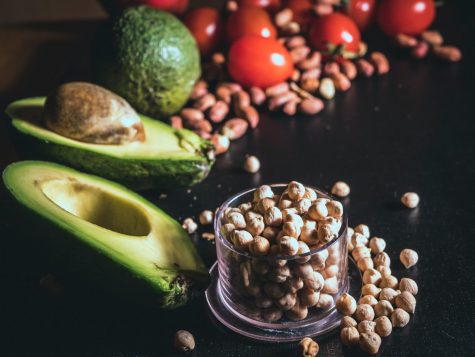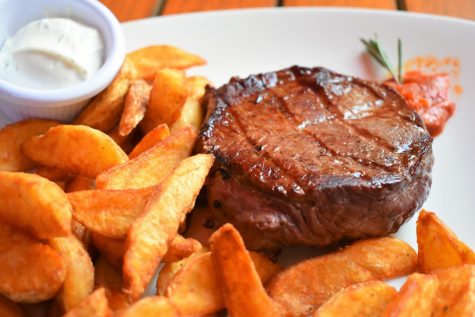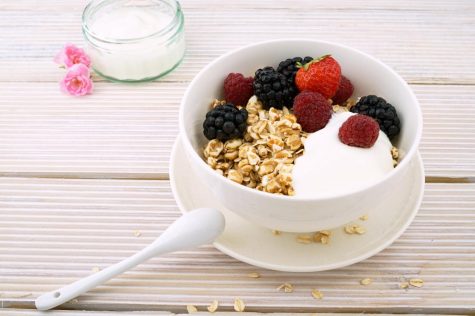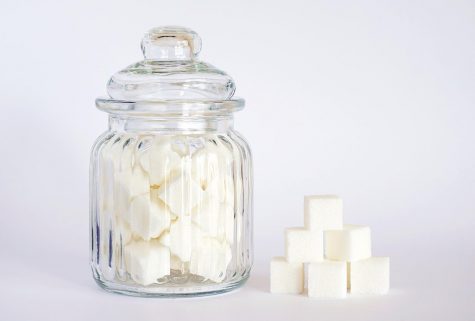Sugar or Fat: Which One is the Worst?
March 4, 2021
“Eat healthier,” they say. “Don’t eat too much sugar,” they say. “Fat is not good for you,” they say. All these “don’ts,” and yet, people still don’t seem to have a good understanding of what sugars and fats are. Is just saying that fats and sugars are bad, good enough? Believe it or not, just saying sugar or fat is actually pretty broad. Some sugars are bad, and some fats are good. How about we dig a little deeper to find what really are these two components, shall we?
 To begin, we first need to know what “fats” really are. There are three kinds. Unsaturated, saturated, and trans fats. Unsaturated fats, the “good ones,” help with lowering bad LDL (low-density lipoprotein) cholesterol, and raise the good HDL (high-density lipoprotein) cholesterol. Why is this crucial? LDL, the “bad cholesterol,” is dangerous if there is too much. LDL cholesterol raises your risk for heart disease and stroke. When you have too much LDL cholesterol in your system, it can build up on the walls of your blood vessels. This blocks blood flow to your heart and other organs. On the other hand, HDL cholesterol removes cholesterol from your blood vessels. It does this by transporting the cholesterol in the blood vessels to the liver, which will later flush out of the body. This reduces the chances of both heart attacks and strokes. Thus, you need to have these fats. Unsaturated can be found in many foods, like almonds, pecans, avocados, and vegetable oils. Saturated fat and trans fat are what need to be avoided.
To begin, we first need to know what “fats” really are. There are three kinds. Unsaturated, saturated, and trans fats. Unsaturated fats, the “good ones,” help with lowering bad LDL (low-density lipoprotein) cholesterol, and raise the good HDL (high-density lipoprotein) cholesterol. Why is this crucial? LDL, the “bad cholesterol,” is dangerous if there is too much. LDL cholesterol raises your risk for heart disease and stroke. When you have too much LDL cholesterol in your system, it can build up on the walls of your blood vessels. This blocks blood flow to your heart and other organs. On the other hand, HDL cholesterol removes cholesterol from your blood vessels. It does this by transporting the cholesterol in the blood vessels to the liver, which will later flush out of the body. This reduces the chances of both heart attacks and strokes. Thus, you need to have these fats. Unsaturated can be found in many foods, like almonds, pecans, avocados, and vegetable oils. Saturated fat and trans fat are what need to be avoided.
Saturated fats are found in red meat, butter, cheese, and many other things. Unlike unsaturated fats, saturated raise LDL cholesterol levels. Too much saturated fat can cause LDL cholesterol to build up in your blood vessels. Saturated fat makes you gain weight, which is why fats are the biggest concern for most people. They contain nine calories per gram of fat, which is twice the amount found in carbs and proteins. Saturated fats do have a good side, their use in long-term energy. It is alright to have saturated fats from time to time, just to be a little cautious.
 Trans fats are the worst kind of fat. Trans fat not only raises your LDL cholesterol but decreases your HDL cholesterol. Not derived from nature, trans fats are found in baked cookies, cakes, pizza, fast foods, and margarine. This is the kind of fat that should concern peopled when it comes to weight gain. They are used because they are cheap, and they’re a good way to keep baked goods from falling apart, and making them last longer. If you wish to lose weight, avoiding foods containing trans fat may be a good start. Don’t forget, just because its name has “fat” in it, doesn’t mean it will make you fat.
Trans fats are the worst kind of fat. Trans fat not only raises your LDL cholesterol but decreases your HDL cholesterol. Not derived from nature, trans fats are found in baked cookies, cakes, pizza, fast foods, and margarine. This is the kind of fat that should concern peopled when it comes to weight gain. They are used because they are cheap, and they’re a good way to keep baked goods from falling apart, and making them last longer. If you wish to lose weight, avoiding foods containing trans fat may be a good start. Don’t forget, just because its name has “fat” in it, doesn’t mean it will make you fat.
Now, it’s time to talk about sugar. Sugar doesn’t have a very good reputation. People are warned about consuming too many products that are labeled “added sugar.” To shed some light on these sweeteners, there must be an understanding of what they do. Similar to fats, sugars can be placed in two categories, natural and added.  Natural sugars are what are recognized as the best kind of sugar you require. They can be found as fructose in fruits, and as lactose in dairy products like milk. For fructose, the fiber inside the fruit helps relax insulin and blood sugar. Because it slows down, the body’s metabolism also slows down with it. In turn, the human body now is less likely to be diagnosed with obesity and type II diabetes. Not all sugar is bad.
Natural sugars are what are recognized as the best kind of sugar you require. They can be found as fructose in fruits, and as lactose in dairy products like milk. For fructose, the fiber inside the fruit helps relax insulin and blood sugar. Because it slows down, the body’s metabolism also slows down with it. In turn, the human body now is less likely to be diagnosed with obesity and type II diabetes. Not all sugar is bad.
Refined sugar, also known as “added sugar,” has the opposite effect. This is where get to the dark side of sugars.  Refined sugars are everywhere. They’re in cereals, donuts, energy drinks, yogurt, and ketchup just to name a few. Refined sugars originate from extracted sugar canes and sugar beets. The human body consumes them the same way as natural sugars, but the sugar is consumed too fast, causing insulin to go haywire. Too much of it heads toward causing the buildup of more fat, which in turn can lead to serious diseases. Refined sugars contain no nutritional value.
Refined sugars are everywhere. They’re in cereals, donuts, energy drinks, yogurt, and ketchup just to name a few. Refined sugars originate from extracted sugar canes and sugar beets. The human body consumes them the same way as natural sugars, but the sugar is consumed too fast, causing insulin to go haywire. Too much of it heads toward causing the buildup of more fat, which in turn can lead to serious diseases. Refined sugars contain no nutritional value.
This article is not a “how to diet.” There are many, many resources out there that help with dieting. This article is to help shed some light on the misconceptions of sugars and fats and to help you get a jumpstart into your healthy eating.